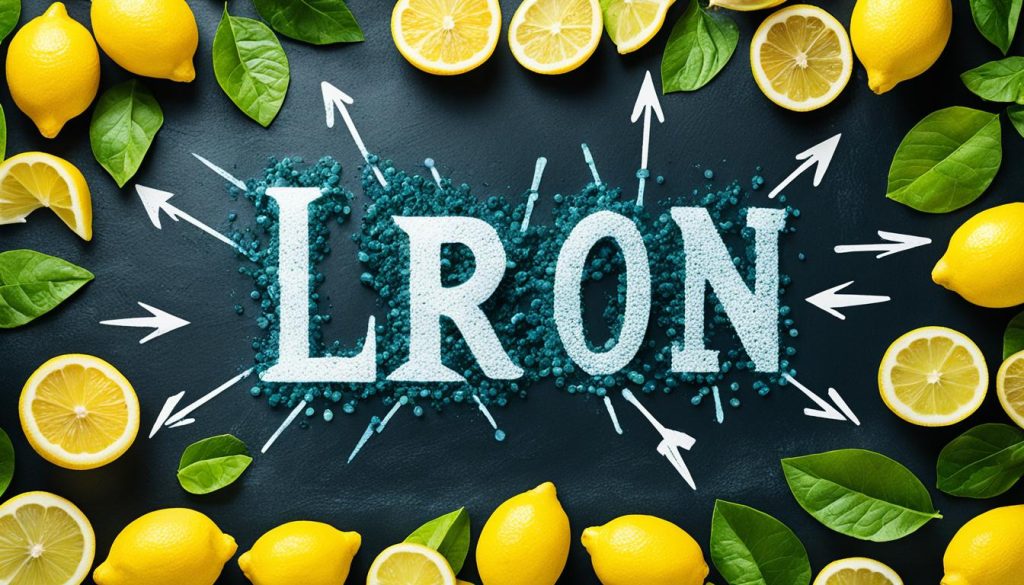Hey there! Have you ever wondered about the health benefits of fresh lemons? Well, you’re in the right place because today I’m going to share with you the incredible ways this citrus fruit can boost your well-being. From aiding weight loss and improving digestion to enhancing your skin’s glow and boosting immunity, lemons offer a whole range of benefits for your health.
Lemons are not only delicious but also packed with nutrients and beneficial plant compounds that can have a positive impact on your body. With their refreshing taste and vibrant aroma, lemons have been a staple in kitchens and traditional medicine for centuries.
Are you curious to know more? Let’s dive into the evidence-based health benefits of fresh lemons:
Health Benefits of Fresh Lemon
- Lemons offer a wide range of health benefits, including weight loss support, improved digestion, and enhanced immunity.
- The vitamin C and plant compounds in lemons can promote heart health by lowering cholesterol levels.
- Lemons may aid in weight control through their soluble fiber content, but more research is needed to confirm their direct impact on weight loss.
- Citric acid in lemons may help prevent kidney stones by creating an unfavorable environment for stone formation.
- Lemons can assist in iron absorption, making them beneficial in preventing iron deficiency anemia.
Ready to reap the citrus boost? Let’s discover how fresh lemons can improve your overall health and well-being!
Support Heart Health with Vitamin C and Plant Compounds
Lemons are an excellent source of heart-healthy vitamin C and plant compounds that have been shown to lower cholesterol levels. Research suggests that consuming fruits and vegetables rich in vitamin C can reduce the risk of heart disease and stroke.
The fiber and plant compounds present in lemons, such as hesperidin and diosmin, also contribute to lowering cholesterol levels. These factors make lemons beneficial for supporting heart health.
To support heart health, incorporate lemons into your diet by adding freshly squeezed lemon juice to water, using lemon zest in cooking, or enjoying a refreshing glass of lemonade. The citrus fiber extract and vitamin C found in lemons can help maintain healthy cholesterol levels and promote overall cardiovascular wellness.
Aid in Weight Control and Management
When it comes to weight control, lemons are often hailed as a weight loss food. However, it’s important to understand that the weight loss effects of lemons are not fully supported by scientific evidence.
One of the reasons lemons are considered beneficial for weight control is due to their soluble pectin fiber content. Soluble fiber can help increase feelings of fullness, which may reduce overall calorie intake and contribute to weight management.
While consuming lemons or adding lemon juice to your drinks can provide some soluble fiber, it’s important to note that drinking just lemon juice alone does not have the same effect as consuming the whole fruit. The fiber content in whole lemons, including the peel and pulp, is higher and more beneficial for weight control.
Additionally, there is evidence to suggest that certain plant compounds found in lemons, such as lemon polyphenols, may have potential weight loss effects. Animal studies have shown promising results in terms of weight reduction. However, more research is needed to understand the specific impact of lemon compounds on weight loss in humans.
It’s worth noting that while lemons may not be a magic solution for weight loss, they can certainly be a healthy addition to a balanced diet. Incorporating lemons into your meals and beverages can provide valuable nutrients and contribute to overall weight control and management.

- Lemons contain soluble pectin fiber, which can increase feelings of fullness.
- Drinking lemon juice alone does not have the same weight loss effects as consuming the whole fruit.
- Plant compounds in lemons, such as lemon polyphenols, may have potential weight loss effects, but further research is needed.
- Lemons can be a healthy addition to a balanced diet and contribute to overall weight control and management.
Prevent Kidney Stones with Citric Acid
Kidney stones can be a painful and debilitating condition. However, certain dietary choices may help reduce the risk of kidney stone formation. Lemons, in particular, contain an important compound called citric acid, which has been shown to have preventive effects against kidney stones.
One of the ways citric acid helps prevent kidney stones is by increasing urine volume. When you consume foods or beverages containing citric acid, like lemon juice or lemonade, it can stimulate the kidneys to produce more urine. This increased urine volume helps flush out any potential stone-forming substances in the body, reducing the likelihood of stone formation.
In addition to increasing urine volume, citric acid also plays a role in regulating urine pH levels. Kidney stones are more likely to form in an acidic environment. By consuming citric acid-rich foods or beverages, such as lemons, you can alkalize your urine, making it less favorable for the formation of kidney stones.
While drinking lemon juice or lemonade can provide a good source of citric acid, it’s important to note that more research is needed to confirm its effectiveness in preventing kidney stones. Additionally, individuals with a history of kidney stones or underlying kidney conditions should consult their healthcare provider before making any changes to their diet.
Overall, incorporating lemons or lemon-derived products into your diet may potentially help prevent kidney stones due to their citric acid content. However, it’s crucial to maintain a balanced diet and consult with a healthcare professional for personalized advice regarding kidney stone prevention.
Protect Against Anemia with Iron Absorption
When it comes to preventing anemia, lemons can play a crucial role in protecting against iron deficiency. Lemons contain two key components that aid in iron absorption: vitamin C and citric acid.
Vitamin C is known to enhance the absorption of iron from non-heme sources, which are primarily found in plant-based foods. It helps convert non-heme iron into a form that the body can easily absorb. This is particularly important for individuals who follow vegetarian or vegan diets, as non-heme iron is the primary source of iron in these diets.
In addition to vitamin C, lemons also contain citric acid, which further promotes iron absorption. Citric acid helps create an acidic environment in the gut, facilitating the breakdown and absorption of iron. By aiding in the absorption of iron, lemons can help prevent iron deficiency anemia and ensure that the body receives adequate amounts of this essential nutrient.
So, whether you’re enjoying a refreshing glass of lemon water or incorporating lemon juice into your meals, you’re not only adding a burst of flavor but also ensuring that your body efficiently absorbs the iron it needs to function optimally.

Reduce the Risk of Cancer with Antioxidants
Observational studies have suggested that consuming citrus fruits, such as lemons, may lower the risk of cancer. While more research is needed to confirm the specific anticancer effects of lemons in humans, animal studies have shown promising results.
Lemons are rich in antioxidants, which are valuable for cancer prevention. Antioxidants help protect the body’s cells from damage caused by harmful free radicals. The flavonoids present in lemons, such as limonene and naringenin, have shown potential anticancer properties in animal studies.
Limonene, a compound found in citrus fruits, has been found to inhibit the growth of cancer cells and promote their self-destruction. Naringenin, another compound in lemons, has been studied for its ability to slow down the growth of tumor cells and prevent the spread of cancer.
More Research Required
While these findings are promising, it is important to note that further research is needed to determine the impact of these compounds on cancer prevention in humans. Clinical trials and studies focusing on lemon consumption and its potential anticancer effects in humans are necessary to provide more conclusive evidence.
Nevertheless, incorporating lemons into a healthy, balanced diet can still contribute to overall cancer prevention due to their high antioxidant content. They make a refreshing addition to drinks, salads, and various dishes, providing both flavor and potential health benefits.
Improve Digestive Health and Boost Immunity
Lemons are not only refreshingly tart and delicious but also offer numerous health benefits that can support your overall well-being. One of the key advantages of consuming lemons is their positive impact on digestive health. Lemons are rich in soluble fiber, particularly pectin, which can promote a healthy gut. The fiber content in lemons aids in regulating digestion, slowing down the process to ensure optimal nutrient absorption and reducing the risk of digestive issues.
Moreover, the high vitamin C content found in lemons plays a crucial role in boosting your immune system. Vitamin C is known for its potent antioxidant properties, which help protect the body against harmful free radicals and strengthen the immune system. By incorporating lemons into your diet, you can enhance your body’s ability to fight off infections and promote overall immune system function.
The citrus flavonoids present in lemons also contribute to improving gut health and boosting immunity. These natural compounds have been shown to have anti-inflammatory and antioxidant effects, which can support a healthy gut environment and enhance immune response. By enjoying the benefits of lemons, you can help maintain a balanced digestive system and promote a strong immune system—keys to maintaining optimal health.
FAQ
What are the health benefits of fresh lemon?
Fresh lemons offer various health benefits, including supporting heart health, aiding in digestion, boosting immunity, and potentially reducing the risk of kidney stones and anemia. They are also a good source of vitamin C and contain beneficial plant compounds.
How do lemons support heart health?
Lemons are rich in vitamin C and plant compounds like hesperidin and diosmin, which have been shown to help lower cholesterol levels. Consuming lemons and other fruits and vegetables high in vitamin C may reduce the risk of heart disease and stroke.
Can lemons help with weight control and management?
While lemons are often promoted as a weight loss food, the weight loss effects of lemons have not been fully supported by scientific evidence. Although the soluble pectin fiber in lemons may increase feelings of fullness, drinking lemon juice alone does not have the same effect. Some studies suggest that certain compounds in lemons, such as lemon polyphenols, may aid in weight loss, but more research is needed to confirm these effects in humans.
Do lemons prevent kidney stones?
Lemons contain citric acid, which may help prevent kidney stones by increasing urine volume and pH levels. Consuming lemon juice or lemonade can provide enough citric acid to potentially reduce the risk of stone formation. However, more research is needed to verify the effectiveness of lemon juice in preventing kidney stones.
How do lemons help prevent anemia?
Lemons contain vitamin C and citric acid, which can enhance the absorption of non-heme iron from plant-based foods. This helps prevent iron deficiency anemia by ensuring that the body absorbs as much iron as possible from the diet.
Can lemons reduce the risk of cancer?
While observational studies suggest a lower risk of cancer in individuals who consume citrus fruits like lemons, more research is needed to confirm the anticancer effects of lemons in humans. Animal studies have shown that certain compounds found in lemons, such as limonene and naringenin, have anticancer properties, but further studies are required to determine their impact on cancer prevention in humans.
How do lemons improve digestive health and boost immunity?
Lemons are rich in soluble fiber, primarily pectin, which promotes gut health, slows digestion, and helps regulate blood sugar levels. Additionally, the high vitamin C and citrus flavonoid content in lemons can boost immunity and protect against infections, thus having a positive impact on both digestive health and the immune system.




